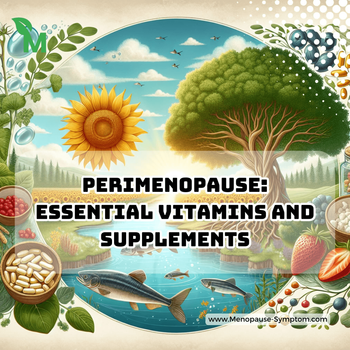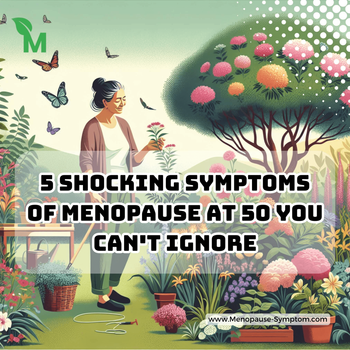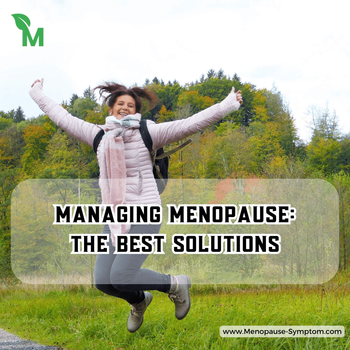Perimenopause: Nutrition And Supplements For Menopause
On
24/10/2024Reading time:
8 min
Summary:
Perimenopause is a challenging transition for many women, usually starting in their 40s. During this time, hormonal changes occur, causing a variety of unpleasant symptoms, from headaches to hot flashes.
To minimize these effects, proper nutrition and supplements play an extremely important role. So, what should we pay attention to in our diet to help our bodies overcome perimenopause easily and effectively?
Understanding Perimenopause
Perimenopause is a natural transition in a woman's life, marking a decline in ovarian function and estrogen production. This process usually occurs between the ages of 40 and 55 and lasts for several years.
Why does perimenopause occur?
The main cause of perimenopause is a decline in ovarian function. When the ovaries function poorly, the amount of estrogen produced also decreases, causing many physical and mental changes in women.
6 common symptoms of perimenopause
· Hot flashes: This is the most typical symptom of perimenopause. A sudden feeling of heat spreads throughout the body, often accompanied by facial flushing, sweating, and rapid heartbeat.
· Menstrual disorders: Menstruation becomes irregular, menstrual blood volume changes (more or less), and can even stop for a long time.
· Mood changes: Feeling irritable, easily agitated, anxious, depressed, having difficulty concentrating.
· Sleep disorders: You have difficulty sleeping, sleeping lightly and often waking up in the middle of the night.
· Vaginal dryness: The vagina becomes dry and sore, causing pain during sex.
· Weight changes: The metabolism to build muscle slows down, along with increased stress due to lack of sleep and anxiety about the above changes. Stress increases weight due to high levels of the hormone cortisol. Therefore, you should exercise regularly and eat a healthy diet.
Other symptoms: Headache, fatigue, muscle and joint pain, decreased sexual desire.
With the above symptoms, improving nutritional needs, maintaining health and improving quality of life is increasingly important during perimenopause.
The Role of Nutrition During Perimenopause
Nutrition can positively affect women's health during perimenopause. A diet rich in healthy foods will help improve hormone balance and reduce the unpleasant symptoms of menopause. Here are a few food groups that should be prioritized:
1. Foods Rich in Calcium and Vitamin D
Menopause increases the risk of osteoporosis due to a lack of estrogen. Therefore, calcium and vitamin D supplementation is essential. Dairy products, nuts and green vegetables are useful sources of calcium. You can also get vitamin D from early morning sunlight or foods like fatty fish and eggs.
2. Dietary Supplements
Many studies have shown that certain dietary supplements can help improve perimenopausal symptoms. Soybeans are a prime example, containing isoflavones that can interact with estrogen receptors in the body. Supplementing with tofu, soy milk, or soy products will bring many benefits.
Isoflavones are a group of phytoestrogens (plant-derived estrogens) found mainly in legumes, especially soybeans. They act as antioxidants, help restore hormonal balance, and provide many health benefits, especially in improving skin and body shape.
Dietary Supplements
In addition to diet, taking dietary supplements is also important during perimenopause. Here are some effective supplements that can help relieve uncomfortable symptoms:
1. Omega-3
Omega-3 is not only good for heart health but also helps reduce menopausal symptoms such as hot flashes and mood swings. You can find Omega-3 in fish oil, chia seeds, and walnuts.
2. Vitamin E
Some studies have shown that vitamin E can help reduce hot flashes and night sweats. You can get vitamin E through foods such as almonds, sunflower seeds, and green vegetables.
3. Magnesium Supplement
Magnesium has a calming effect and reduces anxiety during perimenopause. Some foods rich in magnesium include sunflower seeds, black beans, and bananas.
4. In addition to natural foods, you can use multivitamins according to the dosage to supplement in case there are no suitable foods. You should also consult your doctor before using.
Mental and Physical Care
Good nutrition not only supports physical health, but also has a significant impact on mental health. Symptoms such as anxiety and depression can increase during this period. Try foods rich in B vitamins such as whole grains, chicken, and fish to support mental health. Regular exercise is also important to relieve stress and improve mood.
Other Ways to Support Women During Perimenopause
In addition to nutrition and supplements, there are many other ways you can support yourself during perimenopause. Try to maintain a healthy lifestyle, get enough sleep, and manage stress. Practicing yoga, meditation, or relaxation exercises can also support your mental health in coping with perimenopause symptoms.
Conclusion
Perimenopause is not only a challenge but also an opportunity for women to take better care of themselves. A proper diet and supplements will help you feel more confident during this period. Pay attention to your diet and choose the right foods to help your body overcome menopause more easily and effectively. Don't hesitate to seek advice from a nutritionist to get the best diet for yourself. Perimenopause is a natural part of life, but you can completely control it and make it easier!
Source: Team MPS compiled, analyzed and wrote. Please dont reup without source. Many thanks.

Perimenopause: Essential Vitamins And Supplements
Invalid Date
Perimenopause is an important stage in every woman's life, marking the transition from youth to adulthood.

5 Shocking Symptoms Of Menopause At 50 You Can't Ignore
Invalid Date
Are you approaching your 50s and noticing some unexpected changes in your body? You're not alone.

Managing Menopause: The Best Solutions
Invalid Date
